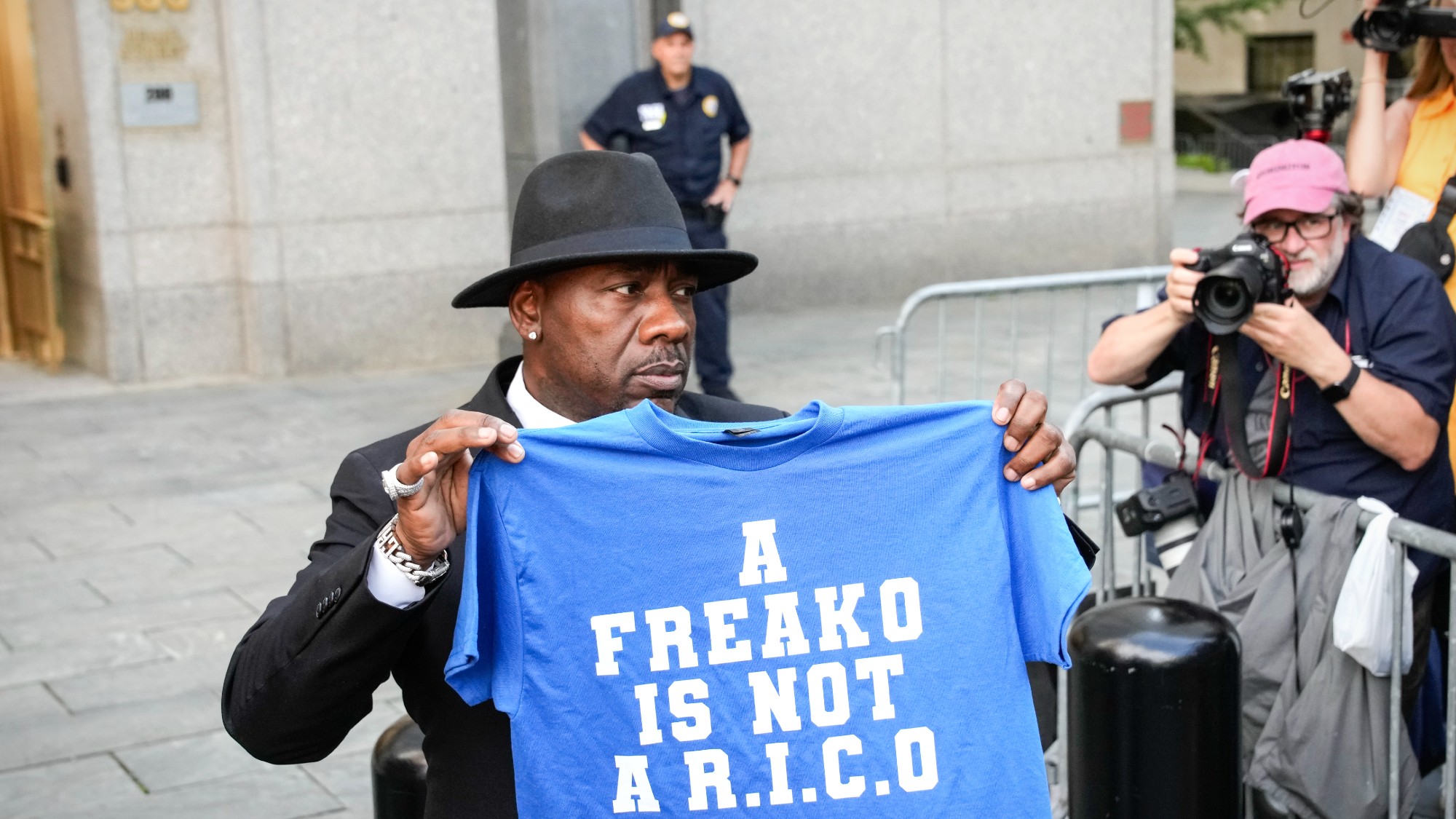Gisèle Pelicot: the case that horrified France
Survivor has been praised for demanding a public trial of the dozens of men accused of raping her

A free daily email with the biggest news stories of the day – and the best features from TheWeek.com
You are now subscribed
Your newsletter sign-up was successful
Gisèle Pelicot has been praised for her composure in France's harrowing mass rape trial against her former husband, Dominique Pelicot, and 50 other men.
The 72-year-old decided to waive her anonymity and allow the public to hear the details of how she was allegedly drugged and rendered unconscious so that dozens of men could rape her.
Public demonstrations in Paris, Lyon and elsewhere, said Le Monde, underscore how her courage is "inspiring people in France and beyond, even as they've been horrified by the scale and brutality of the abuse she suffered over the course of a decade".
The Week
Escape your echo chamber. Get the facts behind the news, plus analysis from multiple perspectives.

Sign up for The Week's Free Newsletters
From our morning news briefing to a weekly Good News Newsletter, get the best of The Week delivered directly to your inbox.
From our morning news briefing to a weekly Good News Newsletter, get the best of The Week delivered directly to your inbox.
Who has been charged?
Dominique Pelicot, 71, is accused of drugging and raping his wife, Gisèle Pelicot. He's also accused of inviting dozens of other men to sexually assault her while she was unconscious, under the effect of heavy sedatives and sleeping pills that he administered to her in secret.
Pelicot, who has confessed to raping his wife repeatedly over the course of 10 years, is on trial, along with 50 other defendants, accused of aggravated rape or attempted rape. Police believe that a total of 72 men were involved in raping the victim from 2011 to 2020.
The assaults were first discovered by police in 2020, when Dominique Pelicot was investigated for taking photos up women's skirts at a French supermarket. Detectives searched his computer and found a folder titled "Abuses", which included thousands of photos and videos of him and other men raping his wife while she was unconscious.
He had found the men through a messaging board called "Without their knowledge" on a now-defunct website, which was notorious for encouraging illegal activities.
A free daily email with the biggest news stories of the day – and the best features from TheWeek.com
Gisèle Pelicot said that she has no memory of the abuse but that she experienced scary, unexplained symptoms, including losing hair and weight, beginning to speak incomprehensibly and suffering memory blackouts.
Why did she choose a public hearing?
Although she could have requested a private trial, Pelicot insisted on the proceedings being held in public to show that victims of abuse shouldn't be ashamed and because accepting anonymity would have been "what her attackers would have wanted", said her legal team.
She has been lauded for her courage but she rejects the praise. "This isn't being brave," she said, "it's having the will and determination to change society," the BBC reported. "Bravery means jumping into the sea to rescue someone. I just have will and determination."
What's the latest?
Defendants are giving their testimony in groups and the trial is expected to continue until late December. More than a dozen of the men have pleaded not guilty, and many have said they were tricked into having sex, "lured by her husband for a playful three-way encounter" and told she was "pretending to sleep because she was shy", said The New York Times.
The trial is taking place before five judges and there is no jury, in keeping with a 2019 law that assigns to regional criminal courts trials of crimes punishable by 15 or 20 years, including rape and robbery.
The accused include a nurse, a journalist, a prison warden, a local councillor, a soldier, lorry drivers and farm workers. All face up to 20 years in prison.
Before they go into the courtroom each morning, "they have to form a queue", said The Atlantic, "shuffling one by one in hunched, sullen fashion", as though they're "waiting in a breadline, or for a bus".
What has the reaction been?
The "horrifying" case is "adding to a larger French reckoning over abuse toward women", said Vox. The defence of some of the men – that they didn't realise it was non-consensual – means they "also thought that husbands can grant access to their wives' bodies", said Time. "In France. In the 21st century."
So "where are all the men horrified" by the trial, asked Daniel Reast in The Independent. It is "now on men – all men – to speak out" because what happened cannot be "passed off as an indefensible extreme which requires no vocal response. Silent disapproval or disgust is not enough."
Sexual offenders are "often imagined as being dysfunctional misfits, when, in reality, they are Mr Everyman", Audrey Darsonville, a professor of criminal law at the University of Nanterre, told The New York Times.
Speaking to The Guardian, Anna Toumazoff, a feminist writer and activist, said the case is "an example of how men still struggle to understand what we face as women". It is "the product of a society that fails to protect women or regard them as full human beings".
Chas Newkey-Burden has been part of The Week Digital team for more than a decade and a journalist for 25 years, starting out on the irreverent football weekly 90 Minutes, before moving to lifestyle magazines Loaded and Attitude. He was a columnist for The Big Issue and landed a world exclusive with David Beckham that became the weekly magazine’s bestselling issue. He now writes regularly for The Guardian, The Telegraph, The Independent, Metro, FourFourTwo and the i new site. He is also the author of a number of non-fiction books.
-
 Political cartoons for February 15
Political cartoons for February 15Cartoons Sunday's political cartoons include political ventriloquism, Europe in the middle, and more
-
 The broken water companies failing England and Wales
The broken water companies failing England and WalesExplainer With rising bills, deteriorating river health and a lack of investment, regulators face an uphill battle to stabilise the industry
-
 A thrilling foodie city in northern Japan
A thrilling foodie city in northern JapanThe Week Recommends The food scene here is ‘unspoilt’ and ‘fun’
-
 Executions are on the rise in the US after years of decline
Executions are on the rise in the US after years of declineThe Explainer This year has brought the highest number of executions in a decade
-
 Ten years after Bataclan: how has France changed?
Ten years after Bataclan: how has France changed?Today's Big Question ‘Act of war’ by Islamist terrorists was a ‘shockingly direct challenge’ to Western morality
-
 France makes first arrests in Louvre jewels heist
France makes first arrests in Louvre jewels heistSpeed Read Two suspects were arrested in connection with the daytime theft of royal jewels from the museum
-
 Thieves nab French crown jewels from Louvre
Thieves nab French crown jewels from LouvreSpeed Read A gang of thieves stole 19th century royal jewels from the Paris museum’s Galerie d’Apollon
-
 Trump lambasts crime, but his administration is cutting gun violence prevention
Trump lambasts crime, but his administration is cutting gun violence preventionThe Explainer The DOJ has canceled at least $500 million in public safety grants
-
 Insects and sewer water: the alleged conditions at 'Alligator Alcatraz'
Insects and sewer water: the alleged conditions at 'Alligator Alcatraz'The Explainer Hundreds of immigrants with no criminal charges in the United States are being held at the Florida facility
-
 Combs convicted on 2 of 5 charges, denied bail
Combs convicted on 2 of 5 charges, denied bailSpeed Read Sean 'Diddy' Combs was acquitted of the more serious charges of racketeering and sex trafficking
-
 The mystery of France's 'needle attacks' on women
The mystery of France's 'needle attacks' on womenIn the Spotlight Nearly 150 women reported being spiked with needles at France's open-air music festival